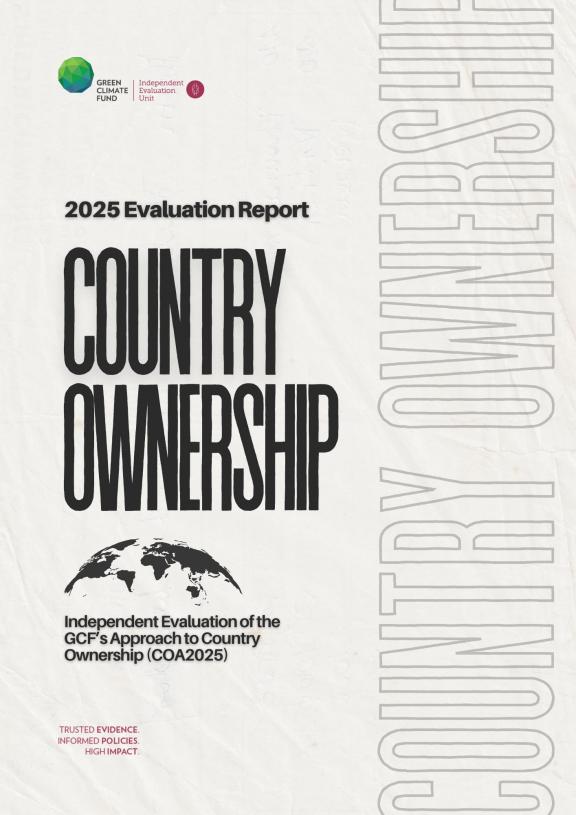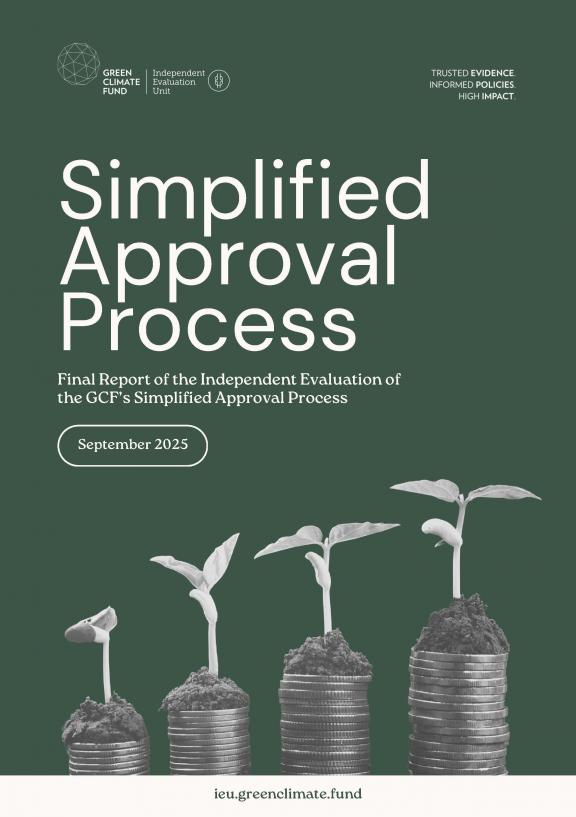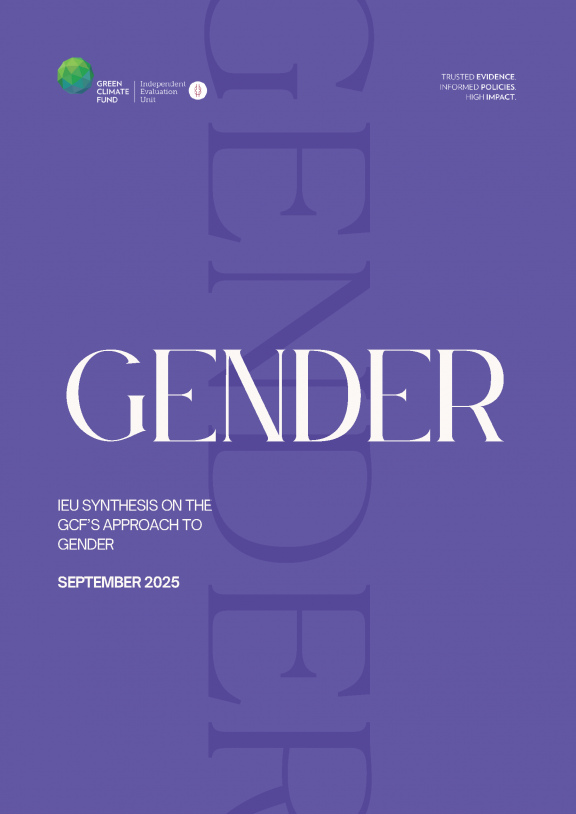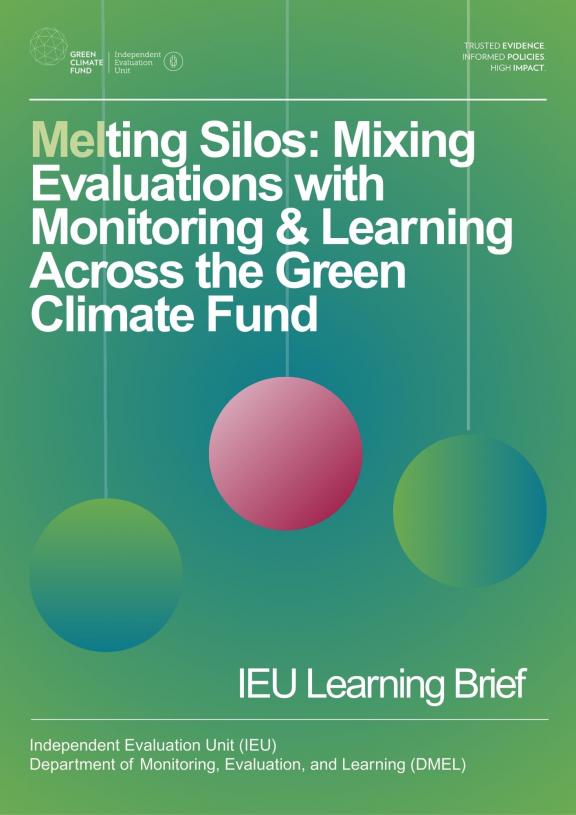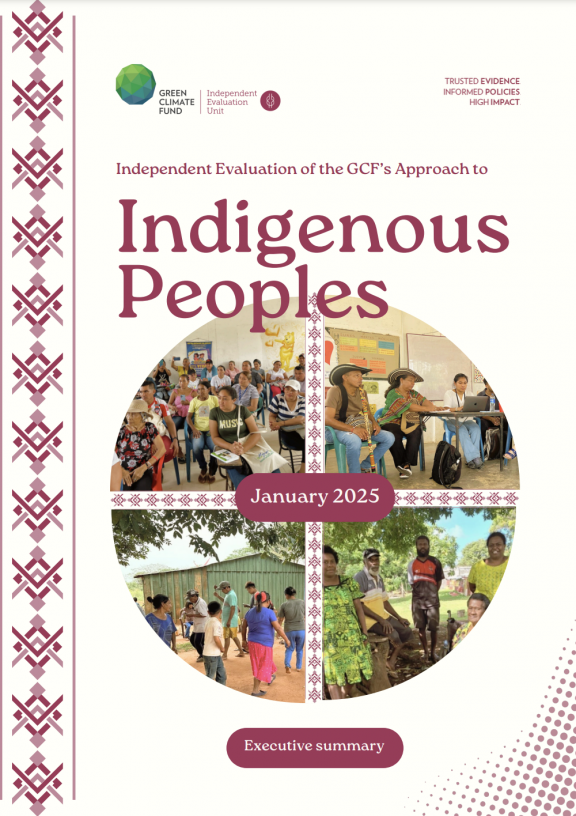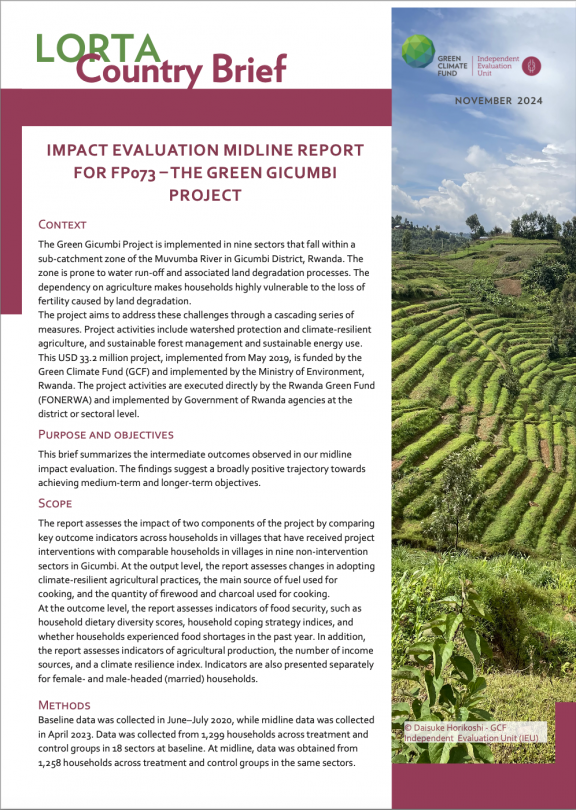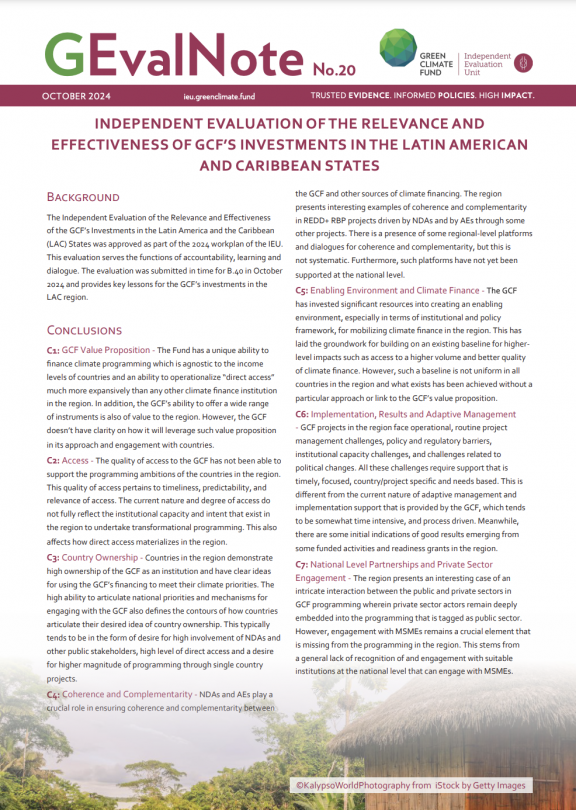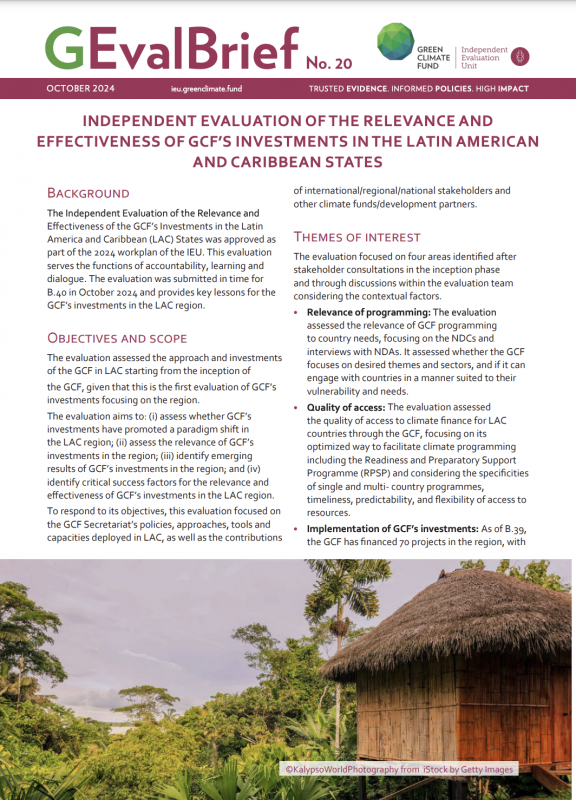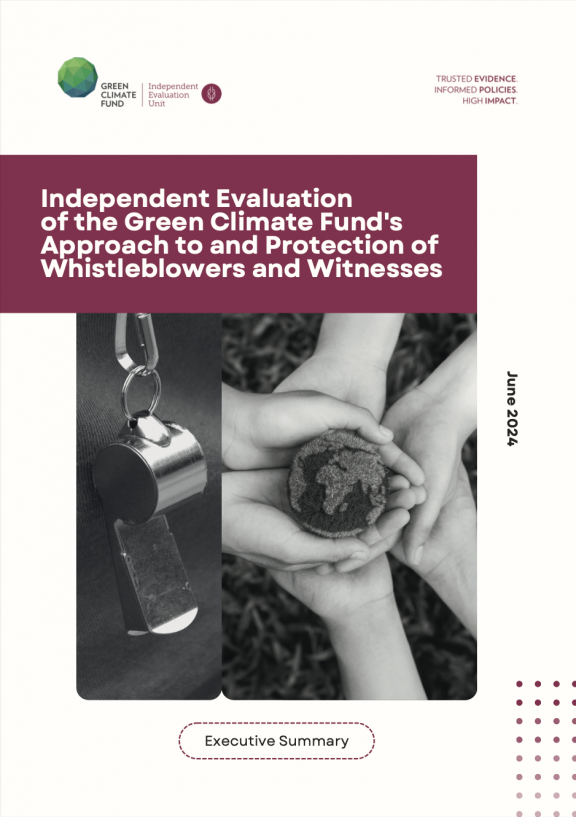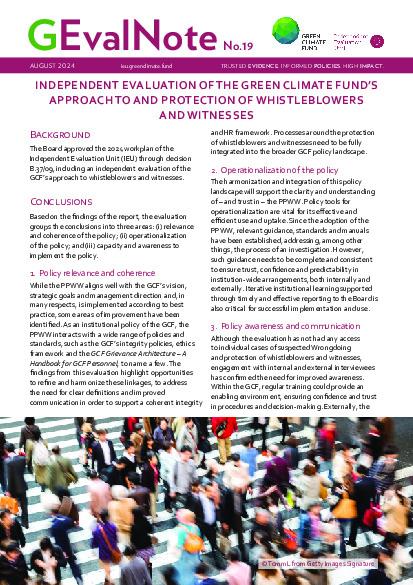IEU publications
IEU publications
To serve the needs of our stakeholders, the IEU issues a variety of publications related to our work, including in the context of evaluations and learning. Keep up with the IEU’s latest publications here.
Featured publications
Independent Evaluation of the GCF's Approach to Country Ownership (COA2025)
This independent evaluation of the Green Climate Fund’s (GCF) approach to country ownership was approved by the GCF Board as part of the 2025 workplan of the Independent Evaluation Unit (IEU) and is submitted in time for its forty-third meeting (B
Independent Evaluation of the GCF’s Simplified Approval Process (SAP2025)
The Green Climate Fund’s Simplified Approval Process (SAP) was created to make climate finance more accessible and responsive, thus enabling smaller, lower-risk projects to address urgent climate needs in vulnerable countries.
Independent Synthesis of the GCF’s Gender Approach
Approved at the fortieth meeting of the GCF Board (B.40), this formative Gender Synthesis consolidates insights from past evaluations, assessments, and studies to inform the forthcoming Independent Evaluation of the GCF’s Gender Approach.
MELting Silos: Mixing Evaluations with Monitoring & Learning Across the Green Climate Fund
This IEU Learning Brief, prepared jointly by the Independent Evaluation Unit (IEU) and the Department of Monitoring, Evaluation, and Learning (DMEL), examines how the Green Climate Fund (GCF) can better align its monitoring, evaluation, and learni
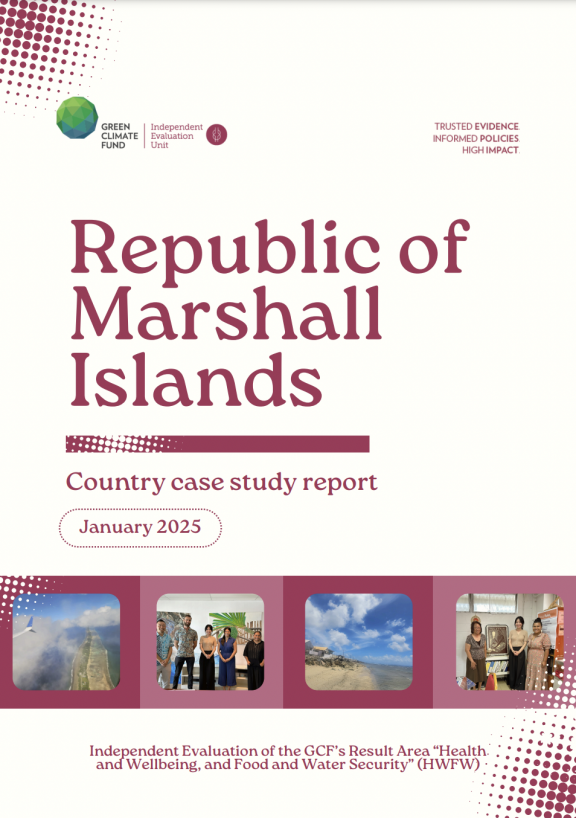
Country case study: Republic of Marshall Islands (HWFW2024)
February 2025
This case study was undertaken as part of the independent evaluation of the Green Climate Fund’s (GCF) Result Area (RA) “Health and Wellbeing, and Food and Water Security” (HWFW). The evaluation was launched in April 2024 by the GCF Independent Evaluation Unit, with the objectives of reporting on the GCF’s HWFW results and progress towards targets, while also shedding light on why results have been achieved or not, and how the GCF’s interventions can be improved.
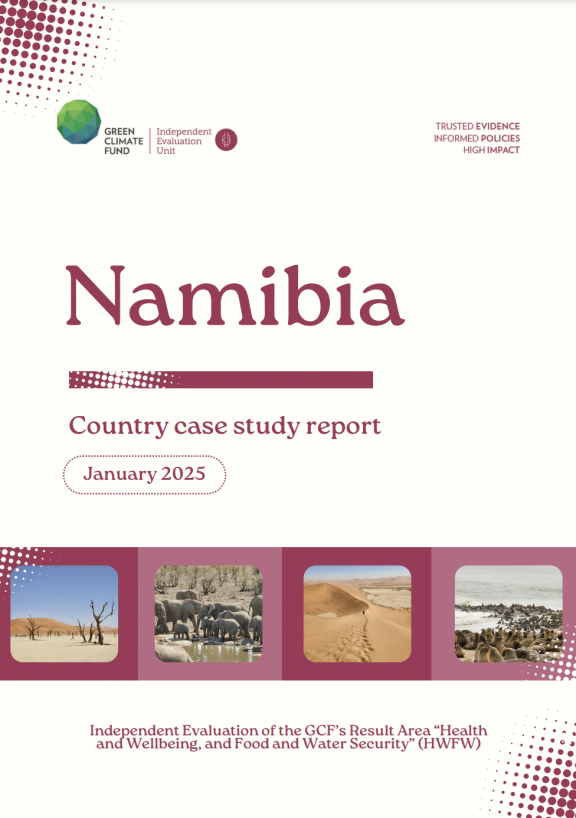
Country case study: Namibia
February 2025
This case study was undertaken as part of the independent evaluation of the Green Climate Fund’s (GCF) Result Area (RA) “Health and Wellbeing, and Food and Water Security” (HWFW). The evaluation was launched in April 2024 by the GCF Independent Evaluation Unit, with the objectives of reporting on the GCF’s HWFW results and progress towards targets, while also shedding light on why results have been achieved or not, and how the GCF’s interventions can be improved.
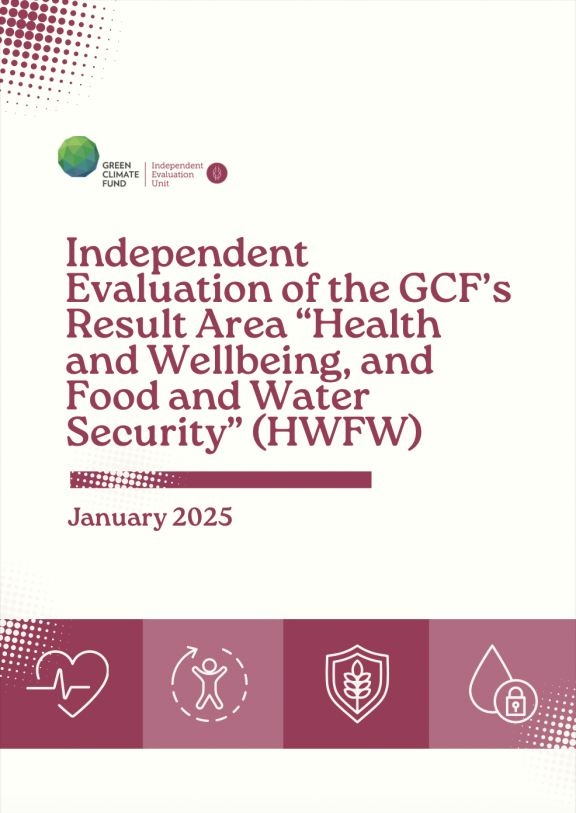
Final Report of the Independent Evaluation of the GCF’s Result Area “Health and Wellbeing, and Food and Water Security” (HWFW)
January 2025
In 2024, the IEU undertook the Independent Evaluation of the GCF’s Result Area “Health and Wellbeing, and Food and Water Security” (HWFW) in line with its Board-approved 2024 work plan.This evaluation was launched in March 2024. The final evaluation report was submitted in January 2025 in time for B.41, the first Board meeting to take place in 2025. This evaluation assessed the actual and likely achievements of the HWFW result area-tagged GCF investments and key factors that enable or hinder...
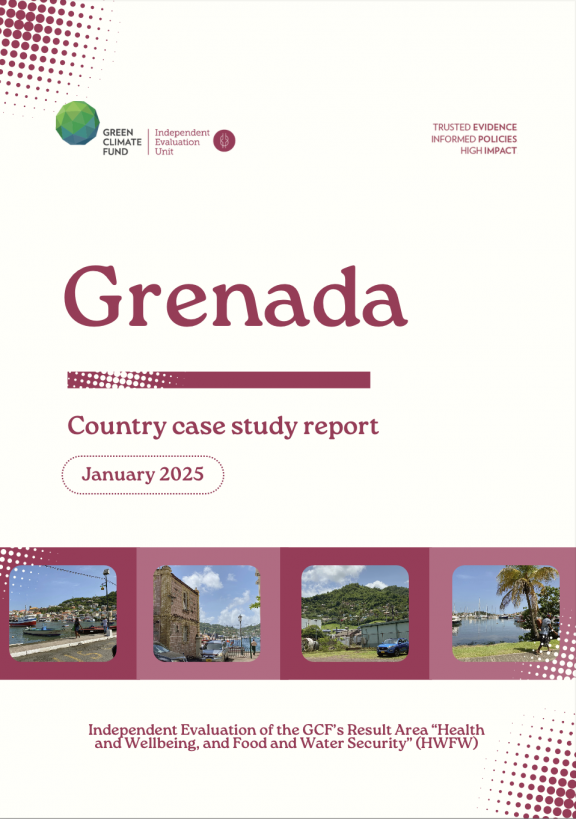
Country case study: Grenada (HWFW2024)
January 2025
This case study was undertaken as part of the independent evaluation of the Green Climate Fund’s (GCF) Result Area (RA) “Health and Wellbeing, and Food and Water Security” (HWFW). The evaluation was launched in April 2024 by the GCF Independent Evaluation Unit, with the objectives of reporting on the GCF’s HWFW results and progress towards targets, while also shedding light on why results have been achieved or not, and how the GCF’s interventions can be improved.
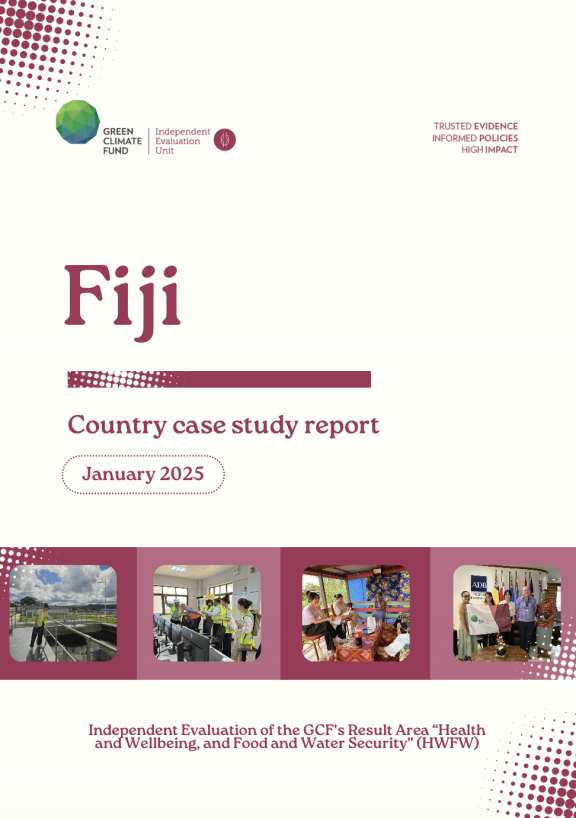
Country case study: Fiji (HWFW2024)
January 2025
This case study was undertaken as part of the independent evaluation of the Green Climate Fund’s (GCF) Result Area (RA) “Health and Wellbeing, and Food and Water Security” (HWFW). The evaluation was launched in April 2024 by the GCF Independent Evaluation Unit, with the objectives of reporting on the GCF’s HWFW results and progress towards targets, while also shedding light on why results have been achieved or not, and how the GCF’s interventions can be improved.
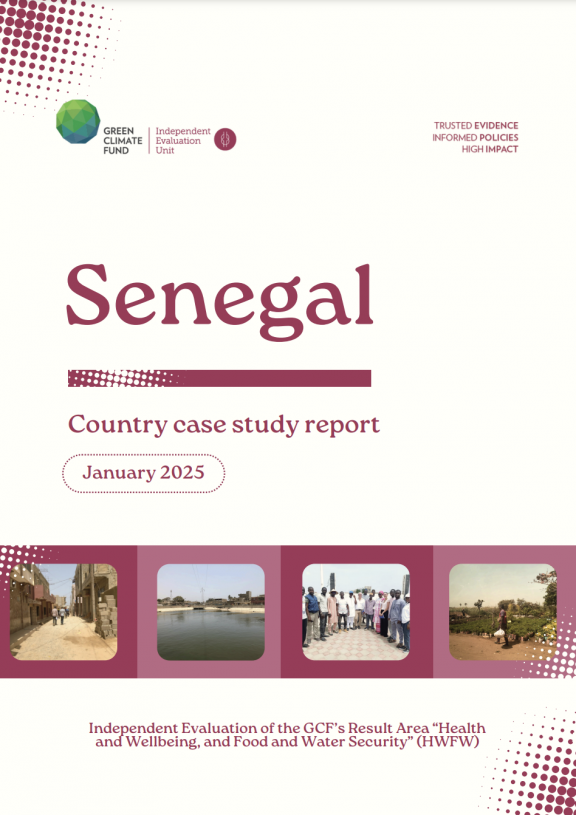
Country case study: Senegal (HWFW2024)
January 2025
This case study was undertaken as part of the independent evaluation of the Green Climate Fund’s (GCF) Result Area (RA) “Health and Wellbeing, and Food and Water Security” (HWFW). The evaluation was launched in April 2024 by the GCF Independent Evaluation Unit, with the objectives of reporting on the GCF’s HWFW results and progress towards targets, while also shedding light on why results have been achieved or not, and how the GCF’s interventions can be improved.
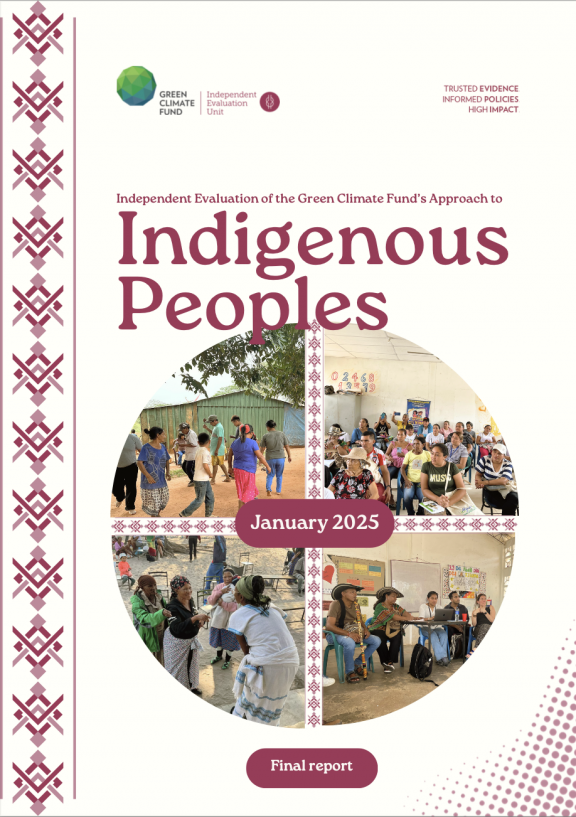
Final Report of the Independent Evaluation of the GCF’s Approach to Indigenous Peoples
January 2025
This report presents the findings and recommendations of an independent evaluation of the Green Climate Fund’s (GCF) approach to Indigenous Peoples (IPs), undertaken by the Independent Evaluation Unit (IEU). The evaluation assesses the relevance, effectiveness, and implementation of the GCF’s Indigenous Peoples Policy, examining its alignment with international commitments and the GCF’s broader policies. Conducted as part of the IEU’s 2024 Work Plan, the evaluation was approved by the Board at...
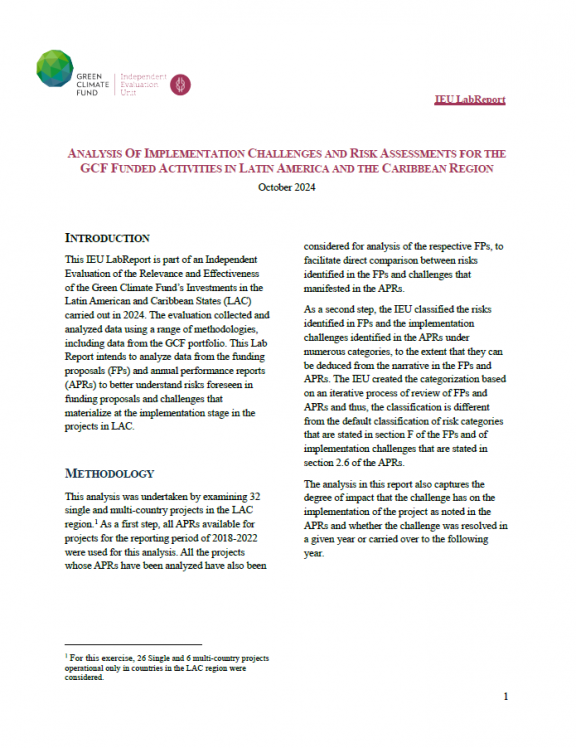
IEU LAC Labreport: Analysis of Implementation Challenges and Risk Assessments for the GCF Funded Activities in Latin America and the Caribbean Region
October 2024
This IEU LabReport is part of an Independent Evaluation of the Relevance and Effectiveness of the Green Climate Fund's Investments in the Latin American and Caribbean States (LAC) carried out in 2024. This Lab Report intends to analyze data from the funding proposals and annual performance reports to better understand risks foreseen in funding proposals and challenges that materialize at the implementation stage in the projects in LAC.
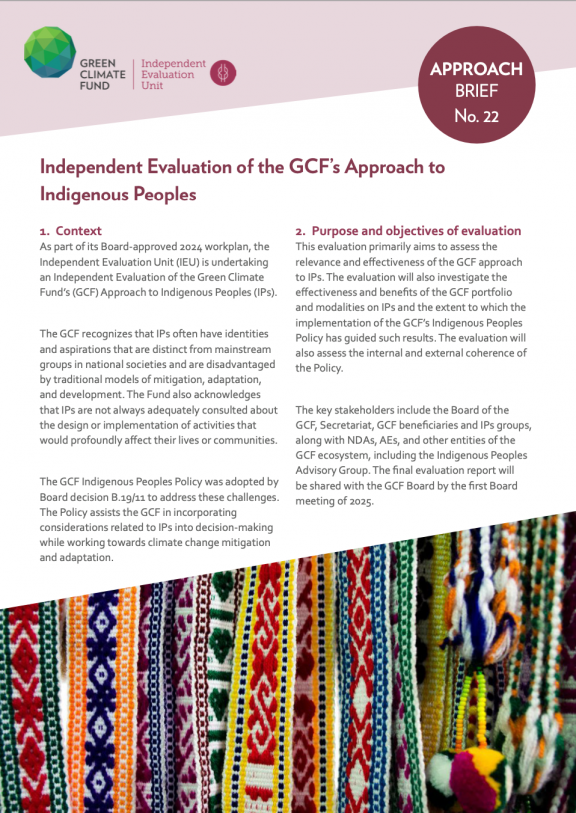
Approach Brief: Independent Evaluation of the GCF's Approach to Indigenous Peoples (IP2024)
October 2024
This brief summarises the approach paper for the Independent Evaluation of the GCF's Approach to Indigenous Peoples (IP2024), including the evaluation’s context, purpose and objectives, scope, methods and timeline.
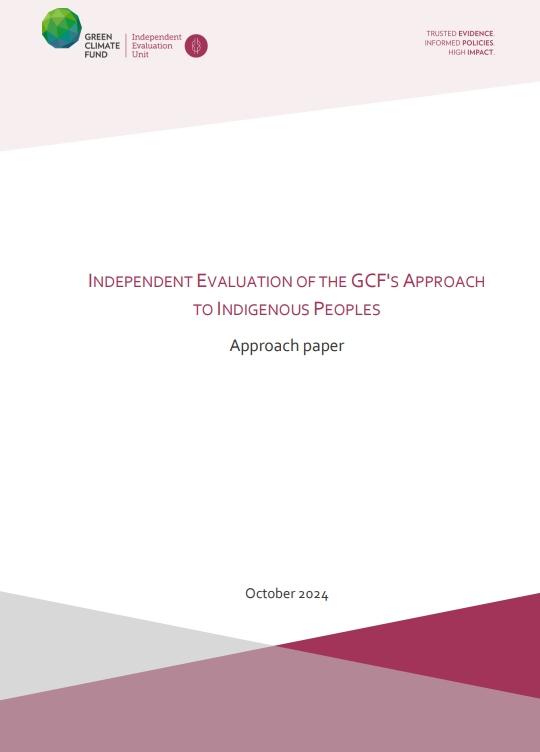
Approach paper: Independent Evaluation of the GCF’s Approach to Indigenous Peoples (IP2024)
October 2024
This paper outlines the approach of the Independent Evaluation of the GCF’s Approach to Indigenous Peoples (IPs). This evaluation primarily aims to assess the relevance and effectiveness of the GCF approach to IPs. The evaluation will also investigate the effectiveness and benefits of the GCF portfolio and modalities on IPs and the extent to which the implementation of the GCF’s Indigenous Peoples Policy has guided such results. The evaluation will also assess the internal and external...
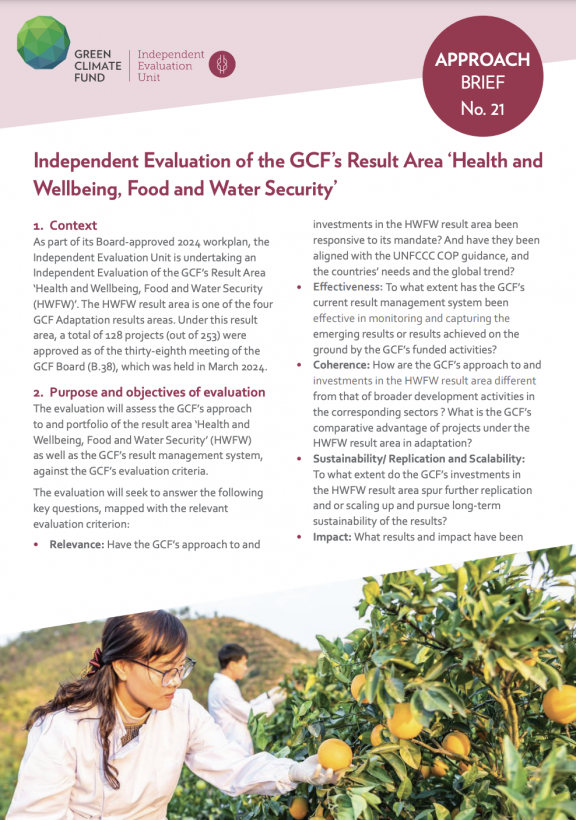
Approach Brief: 'Health and Well-being, and Food and Water Security' Result Area (HWFW2024)
September 2024
This brief summarises the approach paper for the Independent Evaluation of the GCF's 'Health and Well-being, and Food and Water Security' Result Area, including the evaluation’s context, purpose and objectives, scope, methods and timeline.
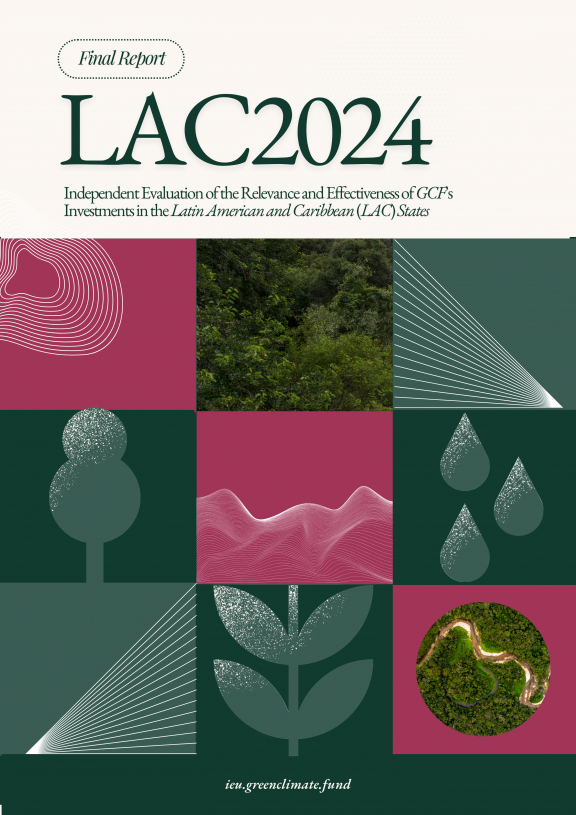
Final Report of the Independent Evaluation of the Relevance and Effectiveness of GCF’s Investments in the Latin American and Caribbean (LAC) States (LAC2024)
September 2024
This report presents the findings and recommendations of an independent evaluation of the relevance and effectiveness of GCF’s investments in the Latin American and Caribbean (LAC) States undertaken by the IEU. The IEU conducted this evaluation as part of its 2024 Work Plan, which was approved by the Board at its thirtyseventh meeting (B.37) in October 2023 (Decision B.37/09 Annex VI).
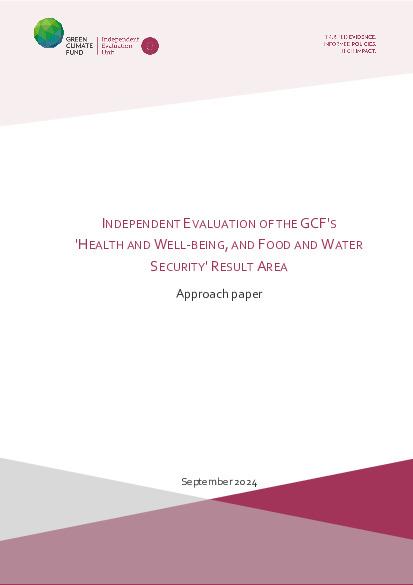
Approach paper: Independent Evaluation of the GCF's 'Health and Well-being, and Food and Water Security' Result Area (HWFW2024)
September 2024
This approach paper lays the groundwork for the Independent Evaluation of the GCF's investments in the 'Health and Well-being, and Food and Water Security' result area. It outlines the evaluation's objectives, methodology, and expected outcomes, emphasizing its role in enhancing strategic decision-making and project effectiveness within the Green Climate Fund’s framework.
